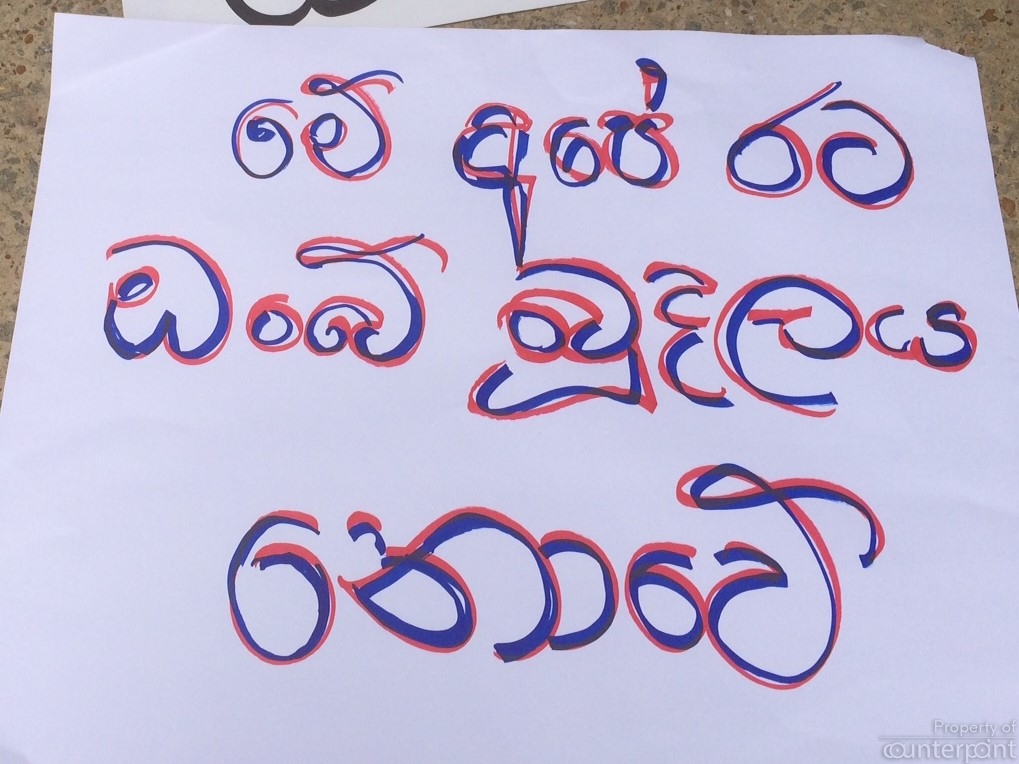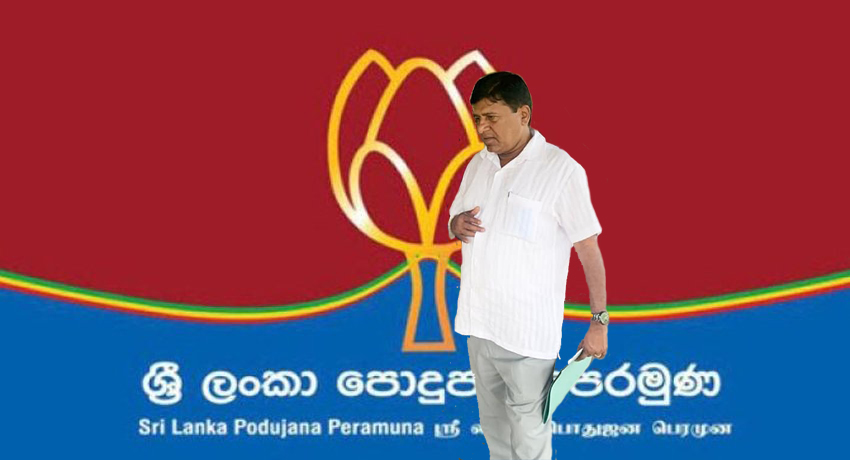
There is a tendency in today’s society, to characterise the ruling class as self-serving, removed from the average citizen in the street, and consider themselves as a distinctive category who are born to rule unquestioned. This situation has arisen as a result of the hybrid governance system introduced in the late 70s, cross overs of MPs from one party or alliance to another at critical moments, extravagant lifestyle of politicians and the associated political culture, conformist role of the mainstream media, failure of education system to produce critical thinkers, the lack of visionaries, intellectuals or the leaders with grassroots appeal who can articulate a different path. More so than the reasons for such a condition of existence, disempowered and voiceless people have a duty and an interest to imagine ways and means of constructing alternative power to the state power- if the state power and those holding it do not change, reform or be accountable to the people.
It is for a reason that political philosophers and constitutional experts have designated people as the entity holding sovereignty. At elections they do not cede power completely to their elected representatives. They simply transfer part of their power to a group of representatives to be able to make decisions on their behalf. However, there is a widespread view among the people in Sri Lanka, that once they elect representatives to the parliament and to the position of executive President, they do not possess power anymore. This is a complete myth.
People consist of a collective of individuals and groups. When individuals get together based on common interests and form into groups, alliances, parties etc. they enjoy more power compared to the power that one single individual holds. However, when individuals are not organised into collective/s, then they can feel powerless, disenfranchised and worthless and even marginalised. Consequently powerless people become alienated from themselves also[1]. This is not only a self-constructed phenomenon. If and when the people holding state power treat other people without such power as powerless and worthless, then their powerlessness can multiply.
If and when the state power does not serve the interests of people because it is corrupt, the process that brings power is subverted, become elitist, unilateral and distanced from the people or indeed hegemonised by a group of self-interested, professional politicians; then people who are disempowered have to imagine alternative power sources, means and centres. Or think about ways to democratise power rather than let it centralise and become demonic/brutal any further. Such an exercise is relevant to the contemporary context in Sri Lanka where the contest for power is within the ruling class itself rather than the ruling class vs the people. Such imaginings are not abnormal. They are quite normal for a people, especially nobodies who have lost a voice to effect change in the internal colonialism constructed in the name of parliamentary democracy (subjugated by the executive) and good governance (In reality, such subjugation exists in the central bureaucracy, law enforcement, and other arms of government).
In the past, we used to believe that the parliament is the supreme. This is not the case anymore. The stark reality shown by current contestations regarding the constitutional rights or powers of the executive President is that there are two centres of power claiming a popular mandate. By the governance system installed after 1977-78, the ruling class has created two centres of power and when the two collide, rival interpretations of the constitution are made to justify each position. In such a context – in order to think beyond the current impasse – what is necessary is to imagine ways to democratise and decentralise power and make it more accountable to the people or indeed imagine sources and means of constructing alternative power.
Such centres of alternative power used to be trade unions, mass media, centres of education or religion, movements of peasants, and student organisations. However, in the Sri Lankan context, some of these centres seem to consider their collective power in a diminished sense or in alliance with the state power depending on the circumstance. This is not surprising. With the onset of globalisation, neoliberal economy and consumerist lifestyle promoted by multinational corporations and the middle classing of society through education, employment and access to state power, those who should be contemplating about alternative power have been marginalising themselves due to lack of clear ideology, articulation of circumstances or the futuristic path for democratisation and decentralisation. Furthermore, instead of creating alternative sources and centres of power from the grassroots or the people themselves, those with capacity to build such power have been looking to the centres of state power to effect change. Thus alignment with agents of state power, i.e. political actors, has been seen as the main avenue to gain power. Time and again this strategy has proven wrong because the political establishment and counter forces in their struggle for power have thrown the country into one crisis after another.
There is no alternative to imagining and constructing alternate power from the people for the people. For this purpose, anti-oppressive organisational strategies need to be imagined, developed and used. As a first step, one needs to identify where and how the oppression and suppression of people’s rights take place? This could be formal and informal agents of state power in various forms e.g. law enforcement. Or various bodies appointed to look after various service areas to do with land, workplace issues, education, employment, trade, district or provincial administration. Perhaps it could be the Local Government or remote areas of the country.
In a system where access to services and formal power is through the personal networks rather than on a first come first serve basis and gate keepers block the entry to power centres to nobodies, unless people develop alternative centres of power, there is no other way of speaking truth to those holding state power. Though we have personalised networks extending to centres of state power, we do not seem to have ‘person centred’ service (irrespective of the status of the person/citizen). If we had such an approach, no bodies will become somebodies instantly.

If ten or twenty people get together around a clear cause and organise, develop an agenda with a vision for changing the oppressive and heartless system in place that is skewed toward somebodies, add more members as time goes, then such a group can become a powerful alternative power centre. Their goals have to be clear. Obviously they ought to focus on aspects of society, system of governance and power centres that need to change. Strategy adopted for change is equally important. Public seminars, meetings, agitations, lobbying, media pronouncements are all important. Word of mouth spreading of the message is equally valuable in a society where rumours spread faster than published news. Constructing a discourse (kathikavatha) is the next step. However, the relationship between discourse and organisation has to be an organic one.
Organisational capacity is in fact more important than the discourse and ideology if the alternative power has to confront state power in certain circumstances for achieving social justice goals based on humanism. Such confrontations take place even today in the floor of courts, workplaces and communities. Alternative power imagination has to be along non-violent path as advocated by great personalities like Gandhi and Mandela. Fighting various forms of bureaucracies, neglect, waste, discrimination, favouritism and manipulation of the truth is part and parcel of imagining and constructing alternative power.
One problem in the imagination of alternative power is the misguided attempts to capture state power in national elections by smaller parties and even individuals in one go. Little they realise that this is an impossible dream due to the power imbalance, campaign dynamics, money power and thuggery. A better approach is to organise and develop alternative power on an incremental manner. For example, after consolidating their alternative power centre/s with the support of likeminded people, such centres or organisations can field a candidate or few for selected marginal seats in the national or provincial elections. If a few can enter the parliament in the first instance, then they can become change agents.

If alternative power is imagined this way and people organise into groups along the changes they desire in the system of governance based on their work needs, community welfare and interests, they will in fact be able to feel and exercise a degree of grassroots or micro power in the face of ever expanding state power that keeps dominating life. Such alternative power may not be the same as the state power. However, it is a counter power emerging from the people for the people in the true sense of the word.
Not to imagine possibilities of alternative power in this liberatory way is to call for more domination, display of power by the ruling class, subservience and subordination while allowing them to use pseudo discourses that justify their hold on state power. Writers, artists, philosophers, academics, teachers, clergy, students, journalists can spend some of their time to imagine such alternative power and articulate ways of establishing centres of the same to advocate for equal opportunity, social justice, fair distribution of services and resources, development programs based on indigenous knowledge and resources rather than borrowed money and expertise. For local problems local solutions need to be found. In such tasks, there is no harm in learning from the experiences of those experiments one can find from the global south previously subjected to imperialist control by the empires of the global north.
[1] Alienation from self is one of the five modes of alienation of individuals that Karl Marx described.




